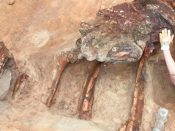Por João Amaral (Department of Physics and CICECO, University of Aveiro, Portugal).
Spin vector models can provide valuable insight into the properties of various families of magnetic materials. Nevertheless, even the conceptually simple Ising spin ½ model (in 2D and 3D) presents challenges on the estimate of measurable thermodynamic properties, such as applied magnetic field H and temperature T-dependent magnetization and specific heat. To confidently compare computer simulations of a given spin vector lattice model to experimental data, approaching the thermodynamic limit is typically desired. Finite size effects will always have an impact on the simulated properties, promoting the development of efficient computational approaches, such as Monte Carlo methods [1]. Metropolis sampling is known to suffer from critical slowing down near the critical point, affecting simulations at or near the critical point, such as the magnetocaloric effect (MCE). The MCE has practical relevance in applications, such as magnetic refrigeration and thermal energy harvesting. High-performance MCE materials present first-order magnetic transitions (FOMPT), resulting from coupled magnetization and structure [2]. To study these materials from a spin vector model approach, it is required to go beyond the Ising model. In this work, I explore the estimate of thermodynamic properties of spin vector models, starting with the standard spin ½ 2D Ising model, via the Joint Density of States (JDOS). The JDOS is a H and T-independent quantity, allowing the estimate of detailed H and T-dependent thermodynamic properties, avoiding critical slowing down. This methodology is also well-suited to study a magneto-volume coupled Ising-like model, for describing a FOMPT. Still, obtaining an accurate estimate of the JDOS is a challenge. I will discuss and compare two approaches, namely the Wang-Landau [3] and Flat Scan Sampling (FSS) [4] methods, combined with the N-fold way bookkeeping approach of Bortz et al. [5]. As examples of these approaches, a magneto-volume coupled Ising-like model is shown to agree with the magnetic and caloric properties of FOMPT systems simulated by mean-field models such as the Landau Theory of phase transitions and the Bean-Rodbell expansion of the Weiss molecular field model [6]. Exploring the free-energy landscape of this model has also given insight into the phase transition kinetics of FOMPT La(Fe,Si)13 refrigerants [7]. Thermodynamic estimates of the spin 7/2 3D Ising model have also provided an accurate estimate and quantitative validation to the recently explored demagnetizing field induced rotating MCE [8].
- [1] D. P. Landau and K. Binder, “A guide to Monte Carlo Simulations in Statistical Physics”, 2nd ed. Cambridge Press (2000)
- [2] V. K. Pecharsky and K. A. Gschneidner Jr., “Giant Magnetocaloric Effect in Gd5Si2Ge2”, Phys. Rev. Lett. 78 4494 (1997)
- [3] F. Wang and D. P. Landu, “Efficient, Multiple-Range Random Walk Algorithm to Calculate the Density of States”, Phys. Rev. Lett. 86 2050 (2000)
- [4] J. C. Inácio et al., “Accurate Estimate of the Joint Density of States via Flat Scan Sampling”, arXiv:2203.02718 (2022)
- [5] A. B. Bortz et al., “A new algorithm for Monte Carlo simulation of Ising spin systems”, J. Comp. Phys. 17 10 (1975)
- [6] J. S. Amaral and V. S. Amaral, “Simulating the giant magnetocaloric effect – from mean-field theory to microscopic models”, Frontiers in Materials 1037396 (2023)
- [7] A. A. Beleza et al., “Structural dynamics of first-order phase transition in giant magnetocaloric La(Fe,Si)13: The free energy landscape”, Mat. Today Phys. 42 101388 (2024)
- [8] R. Almeida et al., “Rotating magnetocaloric effect in polycrystals - harnessing the demagnetizing effect”, J. Phys. Energy 6 015020 (2024)




















